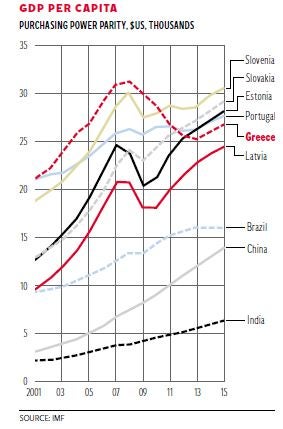It’s not whether we’re rich or poor, but what we expect that really counts
It’s psychologically much more painful to go from something to nothing than it is to go from nothing to nothing.


One of the many joys of growing up in Manchester during the late Eighties and early Nineties was the city’s extraordinarily fertile music scene. “Madchester”, as it was known, churned out a succession of brilliant bands, from The Stone Roses, to The Charlatans, to the Happy Mondays. One of my favourite groups from that era was James, whose 1991 hit “Sit Down” contained the majestic lyric: “If I hadn’t seen such riches I could live with being poor.”
I’ve often found myself recalling that observation as I’ve covered Greece’s downward economic spiral in recent years. Last week, shortly before Athens’ fateful default on a repayment due to the International Monetary Fund, the IMF’s boss, Christine Lagarde, noted acidly that the original loan had been underwritten by many developing world nations with a “much lower standard of living” than the Greeks. In doing so, she was echoing a perennial complaint from some of the smaller eurozone countries. Where is the justice, they ask, in them contributing to a bailout of Greece when their own populations are just as poor, if not poorer? It’s a fair question – and one that deserves a careful answer.
The bare facts are clear. Even after a depression that has wiped out a quarter of its economy, Greece’s population is still not the worst off in the eurozone. As the chart below shows, GDP per head (a very rough gauge of living standards) in Greece remains higher than it is in Latvia. And in 2015 Greece is roughly level pegging with Estonia, Portugal, Slovakia and Slovenia. And income per head is also still much higher than in Brazil, India and China.
So why, then, are the Greeks complaining so much? Why were they rescued at all when, in a global context, they are still reasonably well off? Part of the answer is that expectations matter.
Research shows that it’s psychologically much more painful to go from something to nothing than it is to go from nothing to nothing. The massive downward shift in Greece’s national income in the past five years is what has thrown the country’s population into paroxysms of anger and unrest. It’s the change in income, not the absolute level that matters. Or, as James might have put it: when you’ve seen riches it’s very hard to live with being poor.

Expectation reference point psychology helps to explain a wide range of economic and social phenomena. Some argue that it’s meaningless to talk about “poverty” in advanced countries such as Britain. Those classified as “poor” are not starving or barefoot as they were in Victorian times. They enjoy consumer goods like cars and cotton shirts that previous generations would never have dreamt of owning. They have access to technologies like smartphones and satellite television that were literally unimaginable to their ancestors. Yet the reference point for the less well-off is not the living standards of previous generations of poor people, but the living standards of other people in an economy (or, to be precise, other people in that economy with whom they come into contact). And changing people’s reference point – such as by fiddling with the technical definition of poverty, as our own Government is currently attempting – won’t be easy.
Before they vote to change the definition of poverty, MPs might like to consider that, with their £67,000 a year salary, they are objectively well off compared to the majority of the population. But the expectation reference point of MPs is the pay of company executives and senior civil servants (whom they consider their peers). That’s why they feel desperately poor and demand inflation-busting pay rises.
The reference point is also, incidentally, why migrants from poor countries are prepared to do jobs that workers in advanced countries aren’t particularly keen on. Picking apples for the minimum wage in Britain seems preferable to unemployment in Eastern Europe. Their reference point of expectation tends to be different from the native-born population.
An example from history: the standard of living of settlers in America in the late 18th century was higher than all the other British colonies such as India. And they were more lightly taxed too. But it was the Americans, not the Indians, who threw tea into Boston harbour in 1773 and demanded their independence. What was their problem? The reference point is the answer. They regarded the situation relative to the inhabitants of the motherland, rather than the subjects of the Asian colonies. The wanted no taxation without representation, just like those free-born Englishmen.
Reference points aren’t economically “rational”. Classical economic models assume we make decisions based on an objective understanding of what will make us better or worse off in financial terms. So in classical economic models recessions should be short and self-correcting. The kind of prolonged slump and mass unemployment seen in Greece recently, and also in America during the Great Depression of the 1930s, should not happen. Wages should fall until hiring and investment by firms begins and unemployment disappears.
But that often doesn’t happen. One of the reasons is that wages are “sticky” on the way down. And this stickiness has the same psychological reference point root. People tend to be hugely resistant to taking cuts in their nominal pay, even when this raises the risk that their employer will go bust and they could be laid off. Their reference point of a certain cash salary takes on a massive importance. It’s not just about money, but dignity: their cash salary is their personal reference point by which they compare how well off they are.
Sometimes, of course, people have ludicrous expectation reference points. Think of employees at bailed-out banks who believe they should be paid the same as the hedge fund managers whom they consider to be their peers. Sometimes there is no choice but to brutally introduce people to the real world.
But at other times people’s reference points should be accommodated – or at least understood as a guide to their behaviour. Or as James put it in their 1991 anthem: “Sit down, down, down, down in sympathy.”

Join our commenting forum
Join thought-provoking conversations, follow other Independent readers and see their replies